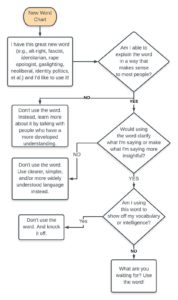Leftists are building and learning new political terms and new political things.
Mostly this is a good thing. But we need to strategically incorporate words in ways that are inclusive and/or advance our goals, and are not counterproductive. See, for example, Sara Lynn Michener on some cases where use of new language can be counterproductive. Michener’s article is far from perfect, though perhaps that’s some of the point.
With that in mind, I’ll boldly (and at least somewhat seriously) propose this flowchart for deciding whether you should use political terms you’ve just heard.

New political language helps the left. Terms from ‘bisexual’ to ‘Black Lives Matter’ to ‘sexual harassment’ have helped people organize around common experiences, feelings, and grievances. These political terms function as pieces of inclusive language and as ways to rally people together to build popular power and resist oppression. They’re especially important to building coalitions within and between identity politics movements, though they also serve class politics.
But it has a dark side. The worst uses of political language are when people intentionally weaponize words without any deeper strategy at play. Think about the times you’ve seen people, without any deeper strategy at all, sharpen social or structural language and use that language as a weapon against individuals. This is not the purpose of social or structural language.
Different Cases
But there are more subtle abuses of terms. People use seemingly inclusive language to exclude others. In particular, small and insular groups, especially among the highly educated, create terms that people without their educational background and/or leisure time find inaccessible. Without a deeper program of political education, these terms can only function to create elite cliques.
So far, this is all a bit abstract. I have thoughts about particular terms, and will probably get around to writing a post someday about the positives and negatives of using words like ‘cultural appropriation’ or ‘fascism.’
For now, I’ll say that my point with a flowchart like the one above isn’t that we should get rid of words or avoid using them in all cases. Rather, it’s about finding the right language for an individual’s level of experience, familiarity, and explanatory abilities. Some people can use complicated or newfangled vocabulary in a way that makes sense to people and helps illuminate things. Others can’t. We should all do some introspection and think about where our input is and isn’t useful.
Postscript
I can’t help but leave you with some J. L. Austin. Austin wrote that “…words are our tools, and, as a minimum, we should use clean tools: we should know what we mean and what we do not, and we must forearm ourselves against the traps that language sets us. Secondly, words are not (except in their own little corner) facts or things: we need therefore to prise them off the world, to hold them apart from and against it, so that we can realize their inadequacies and arbitrariness, and can re-look at the world without blinkers.” (A Plea for Excuses, Philosophical Papers).
“What Should I Read Next?”
If you enjoyed this flowchart, here are some other things you might like reading:
Polyamory and Neoliberalism
Two Concepts of White Privilege
What is Fascism?